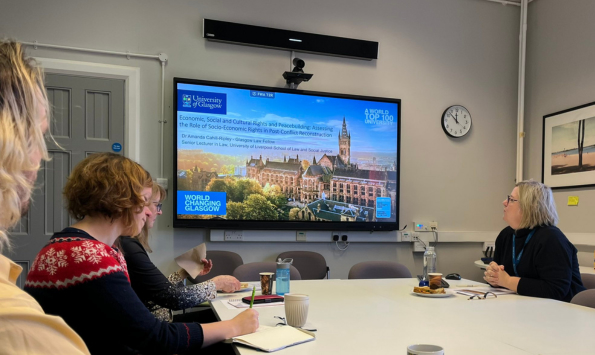Economic, social, and cultural rights
Transforming conflict, building peace.
The research theme ‘Economic, social and cultural rights: Transforming conflict, building peace’, coordinated by Dr Amanda Cahill-Ripley, deepens understanding of the critical role that economic and social rights play in sustaining peace, directly aligning with the UN’s Sustainable Development Goals. Bridging the gap between peacebuilding and human rights communities, the interdisciplinary approach has influenced policy at both national and international levels encouraging the development of innovative practices that support SDG 16 (Peace, Justice, and Strong Institutions), and others such as SDG 1 (No Poverty), SDG 5 (Gender Equality), and SDG 10 (Reduced Inequalities).
Latest research, published by Glasgow Centre for International Law and Security and Oxford University Press, explored how sustainable development and humanitarian aid are incorporated into peace agreements. While sustainable development has received significant attention in peace agreements, humanitarian aid was found to be covered less extensively. Moreover, significantly it was found that 47% of agreements didn't address sustainable development or humanitarian assistance, suggesting a need for further research into the reasons behind this gap.

Funded by the University of Glasgow Law Fellowship, Dr Amanda Cahill-Ripley concluded that peace agreements can provide a solid foundation for peace; however, they must be supported by effective implementation, sufficient resources, and strong political will to create lasting change. As the recent conflict in Sudan demonstrates, peace agreements are just the starting point in the ongoing journey toward sustainable peace. Access the report.
-184x308.png)
This report follows on from the Endless Conflicts research project in collaboration with the University of Glasgow and the Freie Universität Berlin. The research explored the humanitarian-development nexus in the context of protracted armed conflicts. The project sought to make advances towards the operationalisation of the humanitarian-development nexus in the pursuit of sustainable peace, by examining how an integrated and sustainable humanitarian and development response can be anchored in and promoted by international law.
To expand insights on a wider scale, this research has fostered key partnerships, driving forward the field's understanding and development of economic, social, and cultural rights (ESCRs) as tools for transformative justice. These collaborations have specifically aimed to address both armed and societal conflict, promoting community-based peacebuilding, and directly contributing to SDG 10 (Reduced Inequalities) by addressing the needs of marginalised or vulnerable populations facing structural violence, such as those living in poverty (SDG 1).
In the Times Higher Education (THE) Connect podcast, Dr Amanda Cahill-Ripley and Dr Azadeh Chalabi discussed the UN Sustainable Development Goals as the shared set of principles for government bodies, non-governmental organisations (NGOs), and the higher education sector, to work towards.
Listen to the podcast
Through these partnerships, research in this area has informed and shaped policy programmes for civil society organisations (CSOs), including the Economic, Social and Cultural Rights Network (ESRC-Net), advancing policy and legal initiatives within international human rights bodies. The research theme plays a pivotal role in advancing SDG 5 (Gender Equality) by emphasising the importance of women's rights in peacebuilding efforts. Forging relations with international organisations, such as the UN Committee on Economic, Social, and Cultural Rights (UN CESCR) and UN Women. Access the UN report 'Gender inequalities of poverty: feminist and human rights-based approaches' developed as part of the UN's Working Group on discrimination against women and girls.
The research has also highlighted the critical importance of integrating ESCRs into transitional and post-conflict peacebuilding efforts, as demonstrated by ongoing work in collaboration with the Northern Ireland Assembly. Outcomes of the Northern Ireland Assembly's work on a Bill of Rights post-conflict showed the importance of connecting a domestic process with broader international frameworks.
.jpg)
Government bodies and NGOs must collaborate to ensure that Bill of Rights address the long-term needs of individuals and communities, in line with the 2030 Agenda for Sustainable Development.
.jpg)